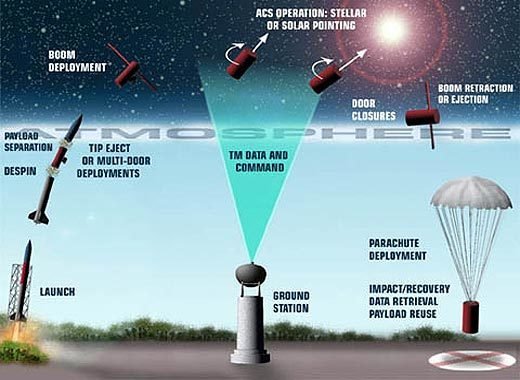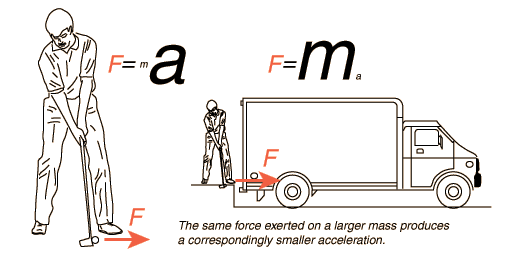Model Rocketry:
The Basics
model rocket
- Nose Cone
- Body Tube
- Fins
- 4 forces throughout flight
- Aerodynamics VERY important
- Short powered flight
- Solid propellant (low mass ratio)
- Passive stability--no control
- Heating not important
- Inexpensive materials


actual rocket
- Nose Cone
- Body Tube
- Smaller rockets have fins
- Bigger rockets have...?
- 4 forces in atmospheric flight
- Aerodynamics less important
- Long powered flight
- Liquid or solid propellant--high mass ratio
- Passive stability--active control
- Overheating is an issue
- Expensive materials


Flight Profile of a Model Rocket

Flight Profile of an Actual Rocket

Text
Click to the right to see a video
of these stages.
Newton's Laws of Motion
#1: Every object in a state of motion tends to stay in motion unless an external force acts on it.

#2: The acceleration of an object depends on its mass and the net force acting upon it.
#3: For every action, there is an equal and opposite reaction.

What do these laws mean for rockets?
- Once the rocket leaves the atmosphere, it no longer needs to propel itself forward. There is no external force (air resistance) in space to slow it down.
- Multi-stage rockets separate and drop the "dead weight" as they fly because decreasing mass increases acceleration.
- by expelling heated gas from the nozzles, rockets receive an equal and opposite force that propels them forward.
They explain why rocket flight is possible!
Newton's Second Law in Action
Click below for a demonstration of this law.
Ethics in Aerospace!
In real rocketry, there are multiple regulations and laws that control how rockets can be launched. You may be surprised to hear that there are similar constraints in model rocketry.
The National Association of Rocketry (NAR) has a safety code that all rocketeers are expected to follow. We'll read through these rules together.

What should you watch out for?
- Materials.
- Motors.
- Ignition System.
- Misfires.
- Launch Safety.
- Launcher.
- Size.
- Flight Safety.
- Launch Site.
- Recovery System.
- Recovery Safety.

Please read and sign your safety form together with your parents or guardian. We won't be able to launch rockets without it!
Fun Video!
Click below :D
Have a good week!
Model Rocketry: The Basics
By Astrid Guerra
Model Rocketry: The Basics
- 958



